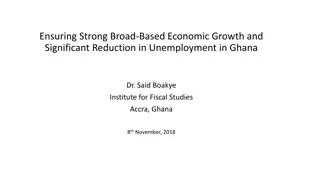Impact of Economic Policies on Productive Sectors in Lebanon Since 1993
This analysis examines the aftermath of economic policies in Lebanon since 1993, focusing on globalization's impact, Lebanese economic policies, and the results of these policies. It discusses the challenges faced by productive sectors and the outcomes on various industries, as well as the implications for unemployment, inflation, and trade deficits.
Download Presentation

Please find below an Image/Link to download the presentation.
The content on the website is provided AS IS for your information and personal use only. It may not be sold, licensed, or shared on other websites without obtaining consent from the author.If you encounter any issues during the download, it is possible that the publisher has removed the file from their server.
You are allowed to download the files provided on this website for personal or commercial use, subject to the condition that they are used lawfully. All files are the property of their respective owners.
The content on the website is provided AS IS for your information and personal use only. It may not be sold, licensed, or shared on other websites without obtaining consent from the author.
E N D
Presentation Transcript
Aftermath of the Economic Policies for the Productive Sectors in Lebanon since 1993 By Musa Freiji FAFS - AUB Feb. 21, 2017
Content Economic Policies Globalization and its impact Lebanese Economic Policies Results of the Lebanese Economic Policies Solutions Final Word 2
Economic Policies Economic Policies should serve the interest of the people: 1. Ensure lowest possible unemployment 2. Ensure lowest possible inflation 3
Globalization and its Impact In the Nineties, Globalization has become blindly an attractive target to most countries: 1. GAFTA in the Sixties 2. WTO in the Nineties 4
Globalization and its Impact (Cont.) Only Exporting Countries benefit from Globalization: 1. Industrial countries 2. Developing countries 3. Under-developed countries 4. Direct subsidies 5. Export subsidies 5
Lebanese Economic Policies Lebanon decided to adopt the globalization policy in Nov. 2000 via a law passed by the parliament No. 4377 Lebanon started negotiations in 2000 with WTO to become a full member rather than an observant member still negotiating 6
Lebanese Economic Policies (Cont.) In compliance with WTO demands: 1. Reduced average tariffs on imports to 5% 2. Passed a revised Consumer Protection Law 3. Passed a revised National Production Protection Law 7
Results of the Lebanese Economic Policies Closure of the shoes industry Closure of the garment industry Closure of most of the medicinal industry Stoppage of legumes production Stoppage of sugar production Reduction in milk, meat and poultry production 8
Results of the Lebanese Economic Policies (Cont.) Unemployment plummeted to 25% Trade deficit escalated to 89% (USD 22.5 billion imports vs. USD 2.5 billion exports) Government deficit is increasing USD 10 billion every year. Now exceeded USD 80 billion 9
Results of the Lebanese Economic Policies (Cont.) Tourism did not cover the gap due to regional conflicts Present employment ability is 5,000/yr. while university graduates exceed 30,000/yr. Employment chances in the GCC countries and Africa are diminishing 10
Solutions 1. Redraft Consumer Protection Law 2. Redraft National Production Protection Law 3. Effective decrease levels of imported goods that are producible in Lebanon to reduce the Trade Deficit 11
Solutions (Cont.) These measures will: 1. Entice investment in protected productive areas 2. Absorb 50% or more of the university graduates 3. Reduce trade deficit 4. Sell local production in the local market 12
Final Word For Lebanon or any other country to elevate itself from a developing country to a developed country and eventually to an industrial country, it has to adopt a protective policy in order to allow the learning process to take its time and effect in every sector and discipline. 13
Thank you, 14





















